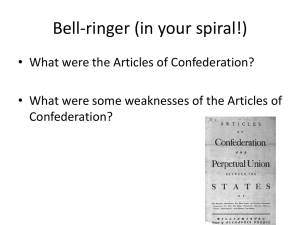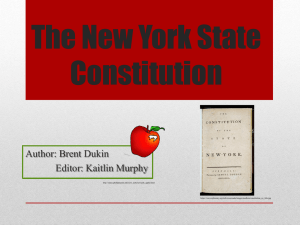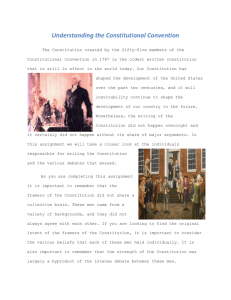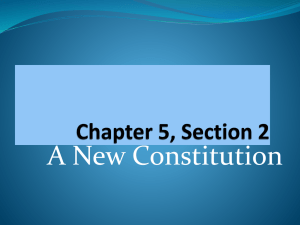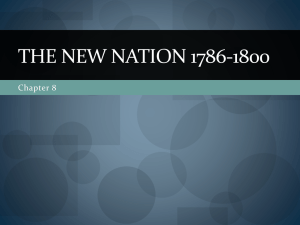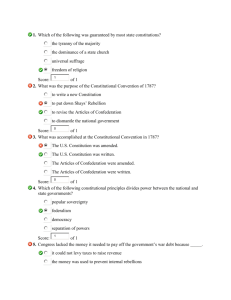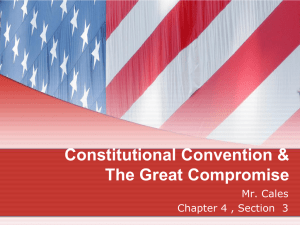Chapter 1
advertisement
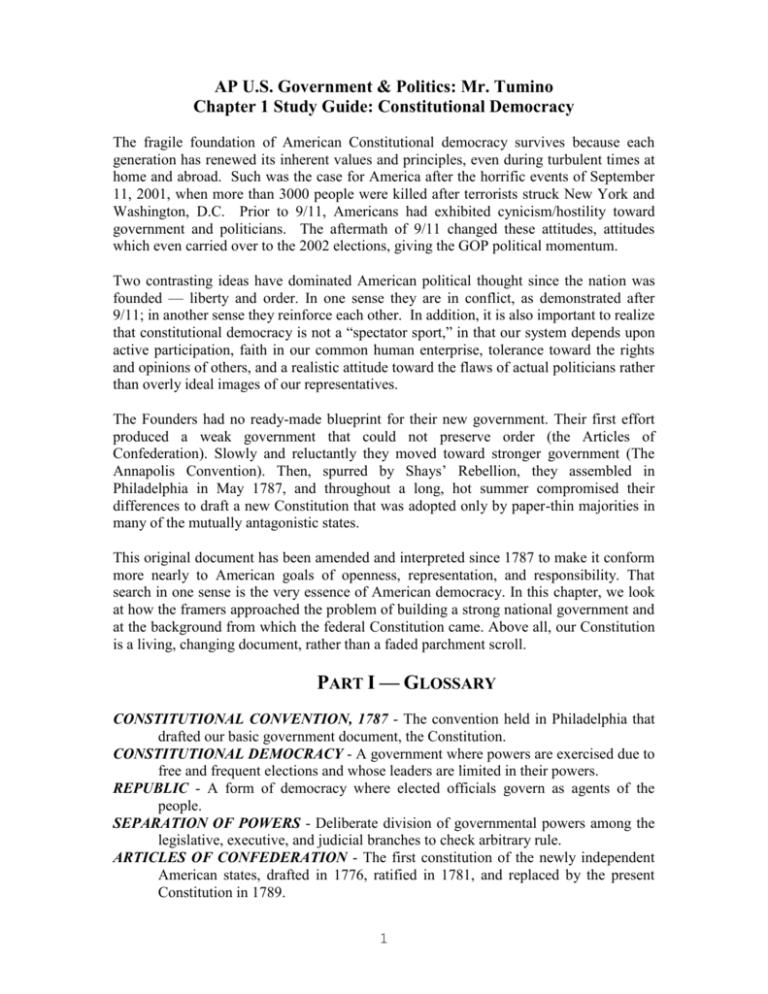
AP U.S. Government & Politics: Mr. Tumino Chapter 1 Study Guide: Constitutional Democracy The fragile foundation of American Constitutional democracy survives because each generation has renewed its inherent values and principles, even during turbulent times at home and abroad. Such was the case for America after the horrific events of September 11, 2001, when more than 3000 people were killed after terrorists struck New York and Washington, D.C. Prior to 9/11, Americans had exhibited cynicism/hostility toward government and politicians. The aftermath of 9/11 changed these attitudes, attitudes which even carried over to the 2002 elections, giving the GOP political momentum. Two contrasting ideas have dominated American political thought since the nation was founded — liberty and order. In one sense they are in conflict, as demonstrated after 9/11; in another sense they reinforce each other. In addition, it is also important to realize that constitutional democracy is not a “spectator sport,” in that our system depends upon active participation, faith in our common human enterprise, tolerance toward the rights and opinions of others, and a realistic attitude toward the flaws of actual politicians rather than overly ideal images of our representatives. The Founders had no ready-made blueprint for their new government. Their first effort produced a weak government that could not preserve order (the Articles of Confederation). Slowly and reluctantly they moved toward stronger government (The Annapolis Convention). Then, spurred by Shays’ Rebellion, they assembled in Philadelphia in May 1787, and throughout a long, hot summer compromised their differences to draft a new Constitution that was adopted only by paper-thin majorities in many of the mutually antagonistic states. This original document has been amended and interpreted since 1787 to make it conform more nearly to American goals of openness, representation, and responsibility. That search in one sense is the very essence of American democracy. In this chapter, we look at how the framers approached the problem of building a strong national government and at the background from which the federal Constitution came. Above all, our Constitution is a living, changing document, rather than a faded parchment scroll. PART I — GLOSSARY CONSTITUTIONAL CONVENTION, 1787 - The convention held in Philadelphia that drafted our basic government document, the Constitution. CONSTITUTIONAL DEMOCRACY - A government where powers are exercised due to free and frequent elections and whose leaders are limited in their powers. REPUBLIC - A form of democracy where elected officials govern as agents of the people. SEPARATION OF POWERS - Deliberate division of governmental powers among the legislative, executive, and judicial branches to check arbitrary rule. ARTICLES OF CONFEDERATION - The first constitution of the newly independent American states, drafted in 1776, ratified in 1781, and replaced by the present Constitution in 1789. 1 SHAYS’ REBELLION - The rural rebellion of 1786-1787 in western Massachusetts, protesting mortgage foreclosures, that engendered conservative support for a stronger national government. VIRGINIA PLAN - A proposal in the Constitutional Convention that provided for a strong legislature with representation in each house determined by population, thus favoring the large states. BICAMERALISM - A two-house form of legislature. NEW JERSEY PLAN - A proposal in the Constitutional Convention that provided for a single-house legislature with equal representation, thus favoring the small states. CONNECTICUT COMPROMISE - A blending of the New Jersey and Virginia Plans that gave equality of representation in one house, representation based on population in the other. THREE-FIFTHS COMPROMISE - An agreement in the Constitutional Convention that counted slaves as three-fifths of a person for both representation and taxation purposes. FEDERALIST - Originally, a supporter of the new Constitution; later, a political party that favored strong central government. ANTIFEDERALIST - Opponents of constitutional ratification and a strong central government. DEMOCRACY - Government by the people, either directly or indirectly, with free and frequent elections. DIRECT DEMOCRACY - Government where citizens meet to discuss and pass laws and select rulers. INDIVIDUALISM - In a political sense, the belief that the welfare of the citizen is more important than that of the state. IDEOLOGY - Basic beliefs about power, government, and political practices. MAJORITY RULE - A basic democratic rule, usually referring to “more than half.” PLURALISM - Refers to a candidate or party winning the greatest number of votes. STATISM - A political theory that holds that the welfare of the nation has topmost priority, transcending the welfare of any or all individual citizens. CONSTITUTIONAL GOVERNMENT - A government restricted by a written or unwritten statement (constitution) under which it functions. SOCIAL CAPITAL – Participation in voluntary associations that reinforce democratic and civic habits of discussion, compromise, and respect for differences. ANNAPOLIS CONVENTION – A convention held in September 1786 to consider problems of trade and navigation. It was attended by five states and important because it issued the call to Congress and the states for what became the Constitutional Convention. PART II — POLITICAL DIALOGUE: THE CLASH OF ISSUES AND IDEAS 1. Defenders of democracy quote Aristotle, who wrote “The guest can judge the banquet better than the chef, though he might not be able to cook the meal.” What is the thrust of this quotation? Does it make a valid point? 2 2. The renowned Spanish political philosopher, Jose Ortega y Gasset has written that the role of the common man in politics has everywhere meant a decline in standards. Is there evidence to support his thesis? What rebuttal could you offer? 3. Former Secretary of State, George Schultz, wrote in 1986 that on the world scene a massive movement toward democracy had begun. Have events since then confirmed his prediction? Cite some specific examples during the 1987-2003 historical period. 4. In “Framing a Constitution”, Sir William Gladstone, the famous British prime minister, once described the American Constitution as “the greatest work that was ever struck off at a given time by the brain and purpose of man.” Without detracting in any way from the Constitution-makers of 1787, how can it be argued that Americans were engaged in writing a constitution from 1607 to 1787? Can a case be made for the idea that the American Constitution is not yet written--although we have been engaged in that project from 1787 to the present date? 5. Many Americans consider politicians to be fundamentally dishonest. Why is this so? Do most Americans truly understand the importance of political compromise? PART III — POLITICAL SCIENCE TODAY 1. Try to imagine what a second Constitutional Convention would be like if it were held today. The 1787 Convention was conducted in total secrecy in order to prevent disruptions from external hostile forces and the possible rallying of opposition to the convention itself. Today, a new convention would take place in the glare of the modern media. It would be virtually impossible for “secrets” to be kept. Given the prospect for such media attention, consider whether: (a) the general public’s interest and attention could be captured and sustained during a second constitutional convention; and (b) the convention could become radicalized due to media pressures. 2. What purpose do radio and TV talk show hosts serve in the on-going discussion about the national political system? Who listens and/or participates in the discussions? Does this segment of the media have an impact on the public’s awareness and understanding of the federal government and its actions? 3. During the ratification struggle, the new Constitution was barely ratified in such important states as New York, Massachusetts, and Virginia. Imagine that these three states had voted not to ratify the Constitution. What strategies would the Federalists have then been forced to follow to try and salvage a difficult political position? Would they have called a new Constitutional Convention? Try to list some possible political strategies that the Federalists might have considered and assess the merits and demerits of each strategy. 3
